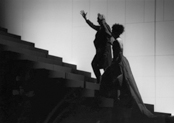OPERA SEARCH

EFFI BRIEST (with Helmut Oehring)
(2000)Libretto by Helmut Oehring and Iris ter Schiphorst, after the novel by Theodor Fontane (G)
deaf soloist (female), voice, male soprano, female speaker;
solo trp-3cl-2tpt-perc(2)-acc-pft(=sampler kbd)-elec.gtr-elec.bass gtr-2vlc.3db-live electronics
Abbreviations (PDF)
Bote & Bock
Kunsthalle, Bonn
Christina Schönfeld / Salome Kammer / Arno Raunig / Ingrid Caven / Jörg Wilkendorf / Ulrike Ottinger, dir
Conductor: Wolfgang Ott
Company: Ensemble musikFabrik NRW
When a composer whose works centre around communication and language collaborates with an artist who is known for her multimedia operas to bring Fontane's Effi Briest to stage, one almost expects a tension between interpretation and deconstruction. It is all but surprising that the work follows the narrative structure of the novel without major gaps. However, both composers have always shown great distrust in the claim of language to produce communication between human beings. As a result they present both the possibilities and the prevention of communication; sound, language, gesture, movement and image intermingle, often failing to create a continuous flow of communication. The complex texture of changing forms of expression makes the depth psychology of the conflict between wish and convention visible, while the identity of voice, character and actor is often ambiguous. The music expresses the intricate relation of language to traditional forms, as the fateful and tragic dimension of the plot is presented on a canvas ranging from chanson to baroque aria.
"The famous story of the noble daughter who is married and has a lover does not happen for the first time in the Briest family. Hardly accidentally, the introductory scene makes it clear that the daughter is going to be married to the former adorer of her mother, Baron von Instetten for the purpose of social advance. The hopes of both fail, the mother wastes away, Instetten advances, Effi dies from unloving coldness. Thus a female fate is passed on from one generation to the next.
In order to recount this in a more general way, the two authors deliberately separate role and text. The theatre of voices is underlined with acoustic sounds which, rather than a drama, create a mood, an atmosphere. The instruments, which combine an ensemble of new music with rock guitar, accordion and big-band, are marked by a sense of reduction. Sounds, often pianissimo, appear dampened, tending towards polluted noise. To this are added radio signals, hissing noises and voices as if from a film, their flatness suggesting emptiness and loss of perspective." (Frank Kämpfer, NZfM, 3/2001)
"genuine theatre music which paints states of with a variety of shades." (Stefan Keim, Die Welt, 13.03.2001)
Tragic
